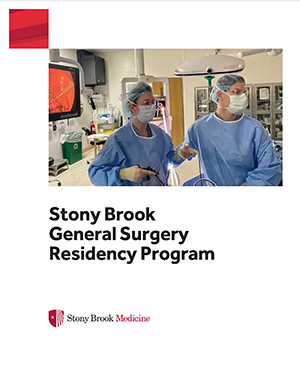Surgical Residency Program
Stony Brook's surgical residency, established in 1974, is an ACGME-approved five-year postgraduate training program, designed to offer residents a broad range of experience in general surgery, as well as in the surgical subspecialties. The general emphasis of the program is to provide residents with an educational experience that will prepare them for a productive and fulfilling career in surgery.
Since the career goals of individual residents differ, it is the goal of our residency training to provide a broad base of surgical education from which a career as a community practitioner, researcher, or academician can be equally well pursued. The program likewise ensures that those residents completing the program will meet the standards of professional excellence adopted by the American Board of Surgery and will be fully eligible for board certification.
Stony Brook University Hospital, a tertiary care hospital serving greater than 1.5 million people on Long Island, provides the academic base for our program of residency training.
The members of our surgical staff are all full-time faculty of Renaissance School of Medicine at Stony Brook University and are committed to resident training. At University Hospital, the resident has the opportunity to rotate not only on the general surgery service, but also to gain experience on cardiothoracic, pediatric, plastics, surgical oncology, minimally invasive & bariatrics, transplantation, trauma/burns, acute care surgery, head & neck, and vascular surgical services. In addition, surgical residents gain an extensive experience in surgical intensive care during rotations in the surgical intensive care unit and cardiovascular intensive care unit.
While University Hospital is the epicenter of our residency training program, several important affiliates (Northport Veterans Affairs Medical Center, Stony Brook Southampton, Good Samaritan Hospital, Stony Brook Eastern Long Island) serve an invaluable role to our resident training. Residents gain a greater breadth of experience observing and learning the various institutional practices and career models available to general surgery graduates furthering their preparation for a fulfilling career individualized to each resident’s career goals.
What To Expect During Residency
First and second-year residents gain a comprehensive experience focused on acquiring the necessary foundational surgical knowledge and early operative skills to manage and care for the surgical perioperative patients on the surgical wards and surgical intensive care unit.
During the third year, residents take on more responsibility as surgeon learners related to patient care, but also take on roles as leaders and educators to junior residents. Additionally, third year residents increasing exposure and experience in the operating room fine-tuning their basic surgical skills gained in junior years while also worked to develop advanced surgical skills.
In the senior years (PGY-4/5), residents take on increasing responsibility in clinical patient care as well as the graduated responsibility of leading surgical services and teams. Senior residents hone and develop their own surgical knowledge and technical skillsets, but also develop the non-technical skills for surgeons so essential to a successful and fulfilling career in surgery. This includes enhancing decision making, communication/teamwork, situational awareness, and leadership.
Educational Didactics: Developed and modified in collaboration with the residency team with emphasis on all facets of surgery to provide the needed foundation for your success: surgical disease knowledge, simulation-based education, quality improvement, diversity/equity/inclusion (DEI) and belonging, ABSITE preparation, mock orals, and career development.
Mentorship: With surgical residents’ individualized career goals, our surgical faculty are engaged in resident mentorship which is paramount to surgical residents successfully navigating residency as well as for career advising and sponsorship towards career success whether it is in preparation for fellowship training or pursuing job opportunities upon completion of residency training.
Opportunities are available for select residents to take 1-3 years’ leave from the clinical training program to pursue career development opportunities (basic/translational/clinical research, Masters programs, etc.); it is, however, not a mandatory requirement of the residency program that residents pursue non-clinical career development.
Please see the following page for information about our GME Prospective Residency Program


